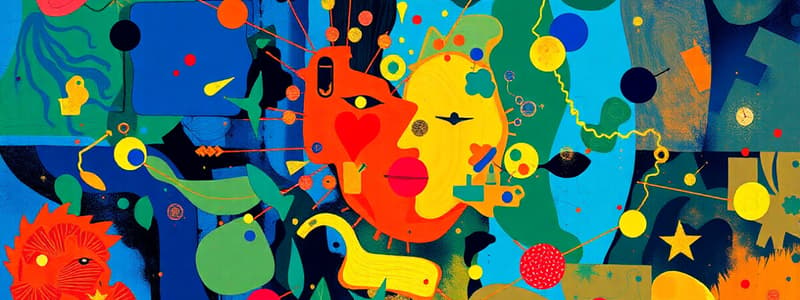Podcast
Questions and Answers
Which of the following is NOT a theory of aging?
Which of the following is NOT a theory of aging?
- Autoimmune Theory
- Cellular Theory
- Hormonal Theory (correct)
- Wear-and-Tear theory
What is the main difference between 'Dying' and 'Death'?
What is the main difference between 'Dying' and 'Death'?
- Dying is a state and Death is a natural consequence of life.
- Dying is a state and Death is a process.
- Dying is a process and Death is a state. (correct)
- Dying is the death of the brain and Death is the death of all body functions.
In which stage of coping with death is a person most likely to make promises to a higher power?
In which stage of coping with death is a person most likely to make promises to a higher power?
- Denial
- Bargaining (correct)
- Anger
- Acceptance
Which of the following is NOT a common physical change associated with aging?
Which of the following is NOT a common physical change associated with aging?
What is the purpose of a Living Will?
What is the purpose of a Living Will?
Which of the following is NOT a characteristic of the aging mind?
Which of the following is NOT a characteristic of the aging mind?
Which of the following is NOT a stage of coping identified in the text?
Which of the following is NOT a stage of coping identified in the text?
Which theory of aging suggests that our cells have a limited number of divisions?
Which theory of aging suggests that our cells have a limited number of divisions?
What is the main function of Hospice care?
What is the main function of Hospice care?
Which of the following is the most common physical change associated with aging in the urinary system?
Which of the following is the most common physical change associated with aging in the urinary system?
What is the definition of 'Biological Age'?
What is the definition of 'Biological Age'?
Which of the following theories of aging suggests that our bodies are programmed to wear out over time due to repeated use?
Which of the following theories of aging suggests that our bodies are programmed to wear out over time due to repeated use?
Which of the following is NOT a physical change associated with aging in the body?
Which of the following is NOT a physical change associated with aging in the body?
What is a common urinary change experienced by older adults?
What is a common urinary change experienced by older adults?
What is the process of decline in body functions that ultimately leads to the death of an organism known as?
What is the process of decline in body functions that ultimately leads to the death of an organism known as?
Which of the following is a stage of coping with death that involves accepting the reality of death and finding a sense of peace?
Which of the following is a stage of coping with death that involves accepting the reality of death and finding a sense of peace?
Which of the following is NOT a common concern associated with aging?
Which of the following is NOT a common concern associated with aging?
What theory suggests that the number of times cells can divide is limited, leading to aging?
What theory suggests that the number of times cells can divide is limited, leading to aging?
What is the condition involving changes in the brain that results in memory loss, disorientation, and cognitive decline?
What is the condition involving changes in the brain that results in memory loss, disorientation, and cognitive decline?
Which of the following is NOT a legal age-related privilege discussed in the text?
Which of the following is NOT a legal age-related privilege discussed in the text?
What is the difference between 'Senescence' and 'Death'?
What is the difference between 'Senescence' and 'Death'?
Which theory of aging suggests that our immune system becomes less effective at fighting off infections as we age?
Which theory of aging suggests that our immune system becomes less effective at fighting off infections as we age?
In the stage of "Bargaining" when coping with death, an individual might say:
In the stage of "Bargaining" when coping with death, an individual might say:
What is "Dyathanasia"?
What is "Dyathanasia"?
Which of the following is a program designed to provide relief and support for terminally ill patients and their families?
Which of the following is a program designed to provide relief and support for terminally ill patients and their families?
Flashcards
Dying
Dying
The process of decline in body functions, resulting in the death of an organism.
Death
Death
The permanent ending of all vital functions.
Brain Death
Brain Death
The cessation of all functions of the entire brain stem.
Denial
Denial
Signup and view all the flashcards
Anger
Anger
Signup and view all the flashcards
Bargaining
Bargaining
Signup and view all the flashcards
Depression
Depression
Signup and view all the flashcards
Acceptance
Acceptance
Signup and view all the flashcards
Living Will
Living Will
Signup and view all the flashcards
Euthanasia
Euthanasia
Signup and view all the flashcards
Biological Age
Biological Age
Signup and view all the flashcards
Psychological Age
Psychological Age
Signup and view all the flashcards
Social Age
Social Age
Signup and view all the flashcards
Legal Age
Legal Age
Signup and view all the flashcards
Functional Age
Functional Age
Signup and view all the flashcards
Wear-and-Tear Theory
Wear-and-Tear Theory
Signup and view all the flashcards
Cellular Theory
Cellular Theory
Signup and view all the flashcards
Immune Theory
Immune Theory
Signup and view all the flashcards
Genetic Theory
Genetic Theory
Signup and view all the flashcards
Hospice
Hospice
Signup and view all the flashcards
Study Notes
Aging and Growing Older Outline
- Aging: The patterns of changes that occur as members of a species grow older. Age is a person's ability to adapt to and care for situations, and refers to people in particular life stages (e.g., habits, roles) and usually the same tastes. Age is determined by years and used to establish privileges like driving and Social Security. Age also refers to how people compare others.
Why Do We Age?
-
Wear-and-Tear Theory: The human body wears out over time, the more abuse the faster it wears out.
-
Cellular Theory: At birth, we have a limited number of usable cells that are programmed to reproduce a limited number of times. Once these cells reach that limit, they begin to die, as do the organs they make up.
-
The Autoimmune Theory: As we age, our immune systems become less effective at fighting diseases.
-
The Genetic Mutation Theory: The number of cells showing unusual or different characteristics increases with age. The more mutations, the greater the chance that cells will not function correctly.
Aging Bodies
-
Skin: Becomes thinner, loses elasticity, fat deposits diminish, possibly showing age spots.
-
Bones and Joints: Weakening and diminished density due to loss of minerals.
-
Head: Features (nose, earlobes) might enlarge.
-
Urinary Tract: Filters waste much slower which may result in a more frequent need to urinate.
Comfort
- Loss of body: thinning of tissues can cause difficulty regulating body temperature.
Aging Minds
-
Intelligence: Slower to learn new skills; however, more practical knowledge from life.
-
Memory: Short-term memory may fluctuate.
-
Depression: Usually due to other medical conditions, losses, economic problems, or social isolation.
-
Senility / Alzheimer’s Disease: A problem associated with loss of memory, judgment, and orientation. A condition involving nerve changes in the brain. This may result in memory loss, disorientation, personality changes, and inability to function independently.
Death and Dying
-
Death: The permanent ending of all vital functions of the entire brain stem.
-
Coping With Death: Experiences might include denial, anger, bargaining, depression, and acceptance.
-
Deciding to Die: A living will is for when one cannot speak for oneself. Euthanasia is a way to speed up death, but involuntary euthanasia is considered illegal. Dyathanasia is refusing life-prolonging treatments for a terminally ill person. Hospices provide emotional support to the ill, dying, and loved ones.
-
Organ Donation: May provide a sense of purpose or personal fulfillment for those whose organs may extend and improve the lives of other individuals.
Studying That Suits You
Use AI to generate personalized quizzes and flashcards to suit your learning preferences.




